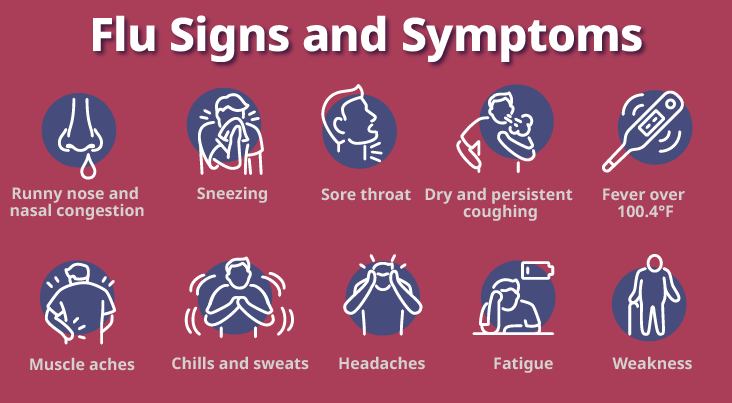COVID-19 and the Flu
While it’s not possible to say exactly what will happen in the fall and winter, it is likely that flu viruses and the virus that causes COVID-19 will both be spreading. In this context, getting a flu vaccine will be more important than ever.
Getting a flu vaccine will not protect against COVID-19, however a flu vaccination provides many other important benefits. Flu vaccines have been shown to reduce the risk of flu illness, hospitalization and death. Getting a flu vaccine will not only help reduce the risk of contracting the flu, but it will also help conserve potentially scarce health care resources.
Many people at higher risk from flu also seem to be at higher risk from COVID-19. And yes, patients can be infected with both flu and COVID-19 at the same time, so it is especially important for those at higher risk for both to get a flu vaccination this year. There is no change in the CDC’s recommendation on timing of vaccination this flu season due to COVID-19. Getting vaccinated in July or August is too early, especially for older people, because of the likelihood of reduced protection against flu infection later in the flu season. September and October are good times to get vaccinated. However, as long as flu viruses are circulating, vaccination should continue, even in January or later.
When going to get a flu vaccine, practice everyday preventive actions and follow CDC recommendations for running essential errands. Remember, that due to COVID-19, some settings that provided flu vaccines in the past, like workplaces, may not offer vaccination this upcoming season because of the challenges with maintaining social distancing. At ID Care, rest assured that we follow the latest CDC vaccination pandemic guidance to provide the safest environment to get a flu vaccine.
Influenza Treatment
Influenza is a viral respiratory infection that affects tens of thousands of people every year. Commonly known as the flu, this infection is caused by viruses getting into the body via the nose, throat, and lungs. It’s highly contagious, especially during flu season. A sick person can transmit the disease through coughing, sneezing, and talking by expelling tiny water droplets that carry the virus.
While most people only get a mild form of the flu and make a full recovery, others get severe influenza and require medical attention. That’s where ID Care comes in. We have locations throughout New Jersey where flu patients can come in for treatment. If you’re experiencing symptoms, call 908-281-0610 to schedule an appointment now.
Flu Signs and Symptoms
The flu and COVID-19 are both contagious respiratory illnesses, but they are caused by different viruses. COVID-19 is caused by infection with a new coronavirus (called SARS-CoV-2) and flu is caused by infection with influenza viruses. Because some of the symptoms of flu and COVID-19 are similar, it may be hard to tell the difference between the two based on symptoms alone. Testing is available at ID Care to help confirm a diagnosis, however there are several signs and symptoms of COVID-19 that are different from flu, the most prevalent being a change in or loss of taste or smell.
Once someone has been exposed to the flu virus, symptoms begin within one to four days, and they tend to come on very suddenly. This is unlike colds, which typically develop slowly over the course of a few days. Common symptoms of influenza include:
- Runny nose and nasal congestion
- Sneezing
- Sore throat
- Dry and persistent coughing
- Fever over 100.4°F
- Muscle aches
- Chills and sweats
- Headaches
- Fatigue
- Weakness
Complications can develop in severe influenza cases, leading to bacterial pneumonia, ear infections, sinus infections, and even death. If a patient has an underlying medical condition, such as diabetes or asthma, that condition may worsen. Older people, pregnant women, children younger than five years old, and anyone with a chronic condition are most at risk of having serious flu-related problems.
Flu Prevention
People of all ages are susceptible to the flu. Luckily, there are things you can do to help prevent yourself from getting sick. The best form of prevention is to get a flu vaccine every year, which you can do at your local ID Care clinic. The vaccine changes every year in order to combat the latest strains of the virus, which is why a new shot is needed.
Also, current COVID-19 safety guidelines are effective in preventing the flu, such as staying away from people who are sick and washing your hands frequently. If you are sick, be sure to cover your coughs and sneezes to help prevent it from spreading to others.
Flu Diagnosis and Treatment
If you’re experiencing flu symptoms, come to ID Care for an appointment with one of our experienced physicians. We’ll thoroughly evaluate your symptoms and may recommend testing to confirm a diagnosis. One such assessment is called rapid influenza diagnostic testing (RIDT), which gives you results in just 15 to 20 minutes.
After you’ve been diagnosed, your physician will explain the best treatment options. Patients with influenza need plenty of rest and should drink lots of liquids. Electrolyte drinks, such as sports drinks, are best. Tamiflu and other antiviral medications may be able to help prevent complications and increase your recovery time. Depending on how severe your case is, the doctor may recommend further treatment.
Sick with the Flu? Go to ID Care
Our physicians help patients with influenza and other respiratory infections all the time, so you can feel confident you’re in good hands at ID Care. To start feeling better sooner, call your local ID Care clinic at 908-281-0610 to schedule a visit. You’re also welcome to make an appointment to get a flu vaccine. Contact the clinic nearest you for more information.

